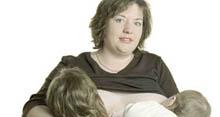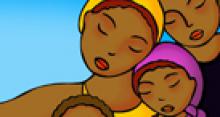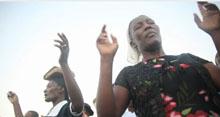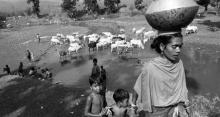Motherhood and Migration
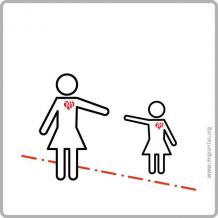

Working with public urban spaces as its platform, Migrantas, an organization based in Germany, aims to make visible the thoughts and feelings of those women and mothers who have left their home country and now live in a new one. Many migrant mothers have to face issues and challenges that come along with trying to belong in a new country or culture, while working for a better future for their children. Migrantas was formed by three women who emigrated from Argentina to Germany in the early 2000s: Marula Di Como, Florencia Young, and Estela Schindel. These women found many shared experiences in being both mothers and immigrants in Germany. They realized that they could have many shared experiences (as well as differences) with other migrant mothers in Germany and the rest of Europe.

Migrant women and their experiences are often invisible to the majority of our society. By focusing on women, Migrantas hopes to shed light on the thoughts and feelings of a sector silenced twice, first as foreigners and secondly as women. The process of making migrant womens’ opinions visible is especially powerful for those from patriarchal cultures, where women are supposed to remain in the domestic realm. Their experiences become a part of the urban landscape, and they see how the city now speaks about them.
Migrantas incorporates tools from the visual arts, graphic design and social sciences. Migrantas meets with migrant women in their own collective spaces--organizations, community centers, cultural groups--and organizes workshops to collectively reflect on issues of migration. Women from very different national, cultural and social backgrounds and with different residency statuses, talk about their experiences and express these in simple drawings.

While Migrant women share a wide variety of thoughts, feelings, and experiences, motherhood is often a common thread. Questions of citizenship for their children, adapting to new cultures while raising children, and other important issues come up time and time again.
After a careful analysis of all the drawings from different workshops, Migrantas culls key elements and common themes from the drawings and translates these central motifs visually and artistically into pictograms--a visual language and a language accessible to everyone. Pictograms are the visual language of Migrantas. A pictogram’s simple, universally understandable image can stir emotions: people from different backgrounds recognize themselves in the representations, while others gain new insights or modify their own perspectives.

One of Migrantas’ major goals is to make the pictograms visible in public urban spaces. They appear as posters where there is normally advertising, as projected digital animations on public screens, or as flyers, postcards or shopping bags.Migrant womens’ perspectives and lived realities are taken out of the individual private space and made visible in the public space, thus creating an encounter which triggers reactions and self-reflection in the passerby in addition to empowering migrant mothers.
All Migrantas projects end with an exhibition. The participants can then see their drawings presented in public and experience public recognition of their voices and social participation.Visitors to the exhibition receive an opportunity to become better acquainted with the experiences of migrant women.
Migrantas was founded by two women who emigrated from Argentina to Germany: Marula Di Como and Florencia Young. Born in Buenos Aires, Argentina in 1963 Marula has lived in Berlin since 2002. She is an artist, and has been exhibiting both on her own and with other artists since 1987. Her work can be found in museums, foundations, and private collections in Argentina and abroad.
Florencia Young was born in Buenos Aires in 1965 and has lived in Berlin since 2002. She studied graphic design at the UBA (Buenos Aires), and has taught typography at a number of universities. She specialises in corporate identity design and multimedia stations, but is also involved in art installations and interdisciplinary projects.
Irma Leinauer joined Migrantas in 2007. Irma was born in Peiting, Germany in 1958 and has lived in Berlin since 1985. She spent a number of years living abroad and studied urban and regional planning at the Technical University in Berlin. She has published on the history of modern architecture, housing and social neighbourhood development. Learn more about Migrantas at their website.
Related Content
|
In her series of stark, simple images of women breastfeeding their children, Clare Yow invites us to rethink public breastfeeding. |
Valerie Mason-John tells the affecting story of a woman in Sierra Leone who lost many of her children and watched her country be torn apart by war and the search for blood diamonds. |
This visual poem celebrates the strength that many Haitian mothers have displayed in the wake of the devastating 2010 earthquake. |
Pattabi Raman’s photo series portrays of women in rural India who fulfill the dual roles of mother and financial breadwinner for their family.
|
